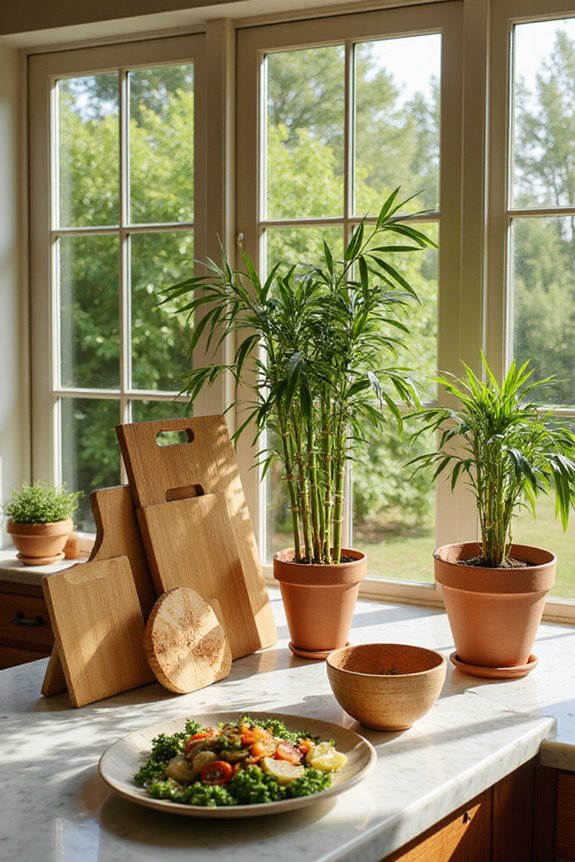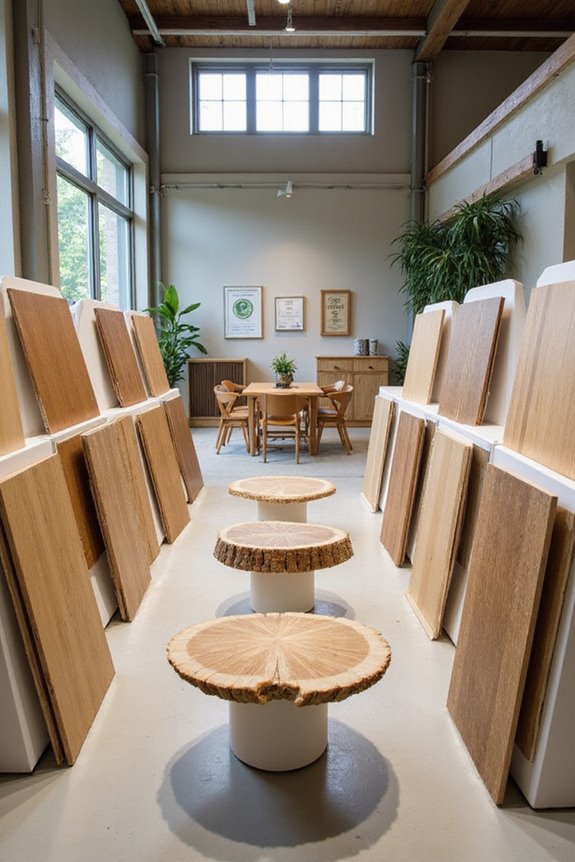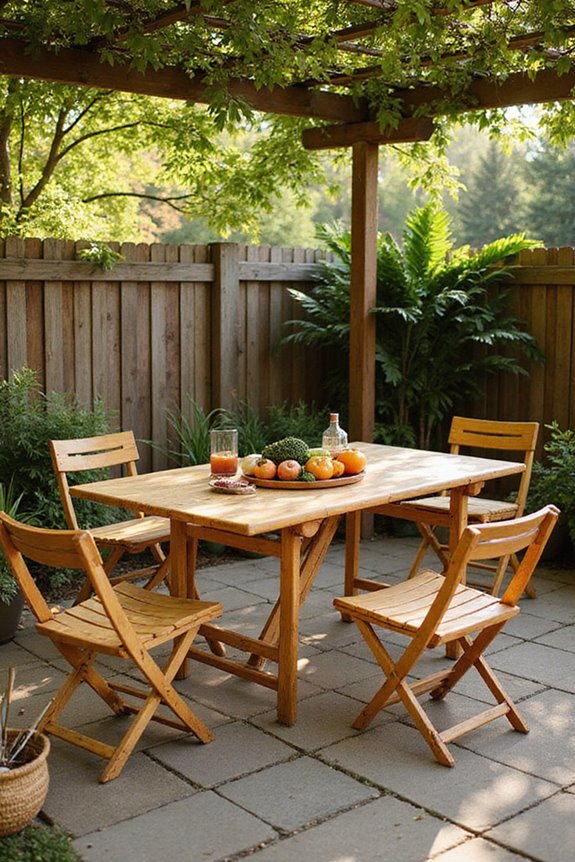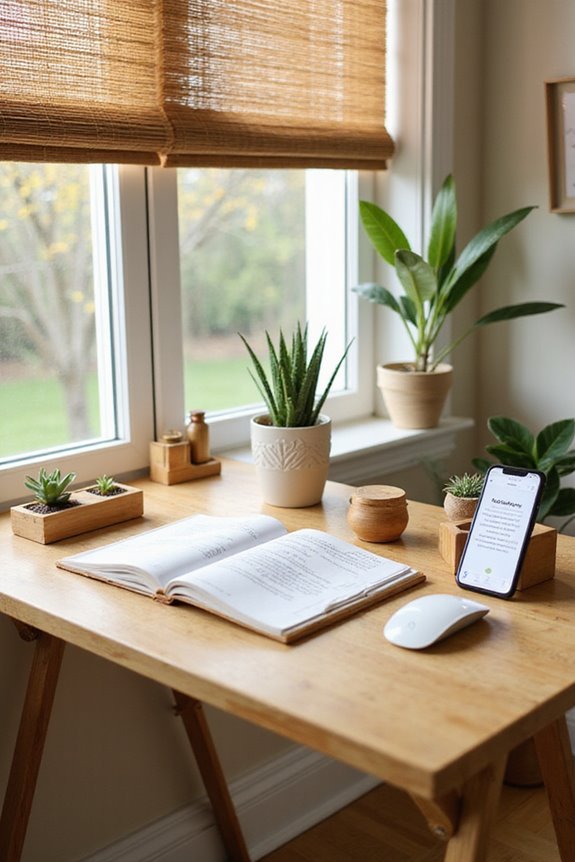Bamboo products bring numerous environmental benefits. First, they capture significant amounts of carbon, helping combat climate change. Bamboo also produces 30-35% more oxygen than trees, improving air quality. Its strong root system effectively prevents soil erosion and enhances water retention. Plus, bamboo requires little to no chemical use during cultivation. This makes it a sustainable alternative to traditional materials. There’s even more we can explore about bamboo’s advantages and its impact on our environment.
Key Takeaways
- Bamboo products are biodegradable, significantly reducing landfill waste and pollution compared to non-biodegradable materials like plastic.
- Bamboo has a high carbon sequestration potential, capturing significant amounts of CO2 and contributing to climate change mitigation.
- The cultivation of bamboo requires minimal pesticides and fertilizers, promoting eco-friendly agricultural practices and reducing chemical usage.
- Bamboo’s rapid growth rate allows for sustainable harvesting every 3 to 5 years, supporting resource regeneration and sustainability.
- Bamboo supports biodiversity by providing habitat and thriving in diverse environmental conditions, enhancing ecosystem health.
Carbon Sequestration Potential
While many people might not think about it, bamboo has a remarkable ability to capture carbon from the atmosphere. Through bamboo cultivation, we can create effective carbon sinks that help combat climate change. For example, Moso bamboo can potentially store over 36 teragrams of carbon in specific regions. Its rapid growth allows it to sequester carbon much faster than traditional trees, making it an excellent choice for reforestation.
- Bamboo forests can store between 94 to 392 tonnes of carbon per hectare.
- Managed bamboo forests maximize carbon sequestration through regular harvesting and replanting.
- Converting degraded lands to bamboo plantations can also boost carbon stocks and improve soil health.
Enhanced Oxygen Production
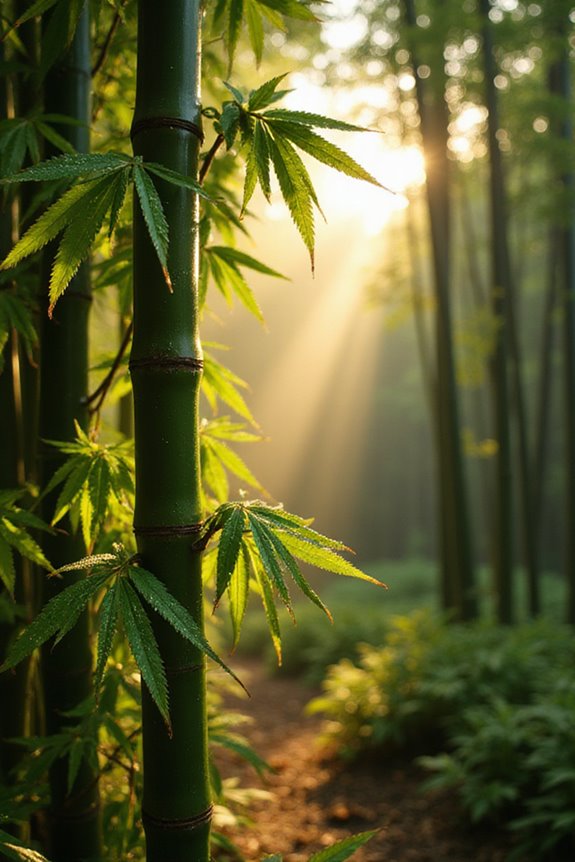
Bamboo’s remarkable ability to capture carbon is matched by its impressive oxygen production. Did you know that bamboo produces about 30-35% more oxygen than an equivalent area of trees? This is due to its dense forest stands and rapid growth. Certain bamboo species, like Guadua, can produce up to 58% more oxygen compared to trees in the same area.
- Bamboo grows year-round, ensuring continuous oxygen output.
- Its high metabolism allows for faster energy conversion from sunlight and carbon dioxide.
- Rapid growth rates mean quicker replenishment of oxygen-producing biomass.
- Air purification benefits make bamboo a valuable addition to indoor spaces.
In an oxygen comparison, bamboo consistently outperforms most tree species. By planting bamboo, we can actively contribute to cleaner air and a healthier environment for all.
Soil Conservation and Erosion Prevention

Soil conservation and erosion prevention are essential for maintaining healthy ecosystems, especially in areas prone to degradation. Bamboo’s extensive root structure binds soil particles together, reducing erosion by up to 75% compared to bare ground. Its roots create natural reinforcement, protecting topsoil during heavy rain and strong winds.
- Bamboo stabilizes shallow soil layers effectively, making it ideal for slopes and erosion-prone lands.
- The root system enhances soil structure, improving water retention and reducing runoff.
- Bamboo also increases water infiltration rates, vital for keeping the soil moist.
Reduced Chemical Usage
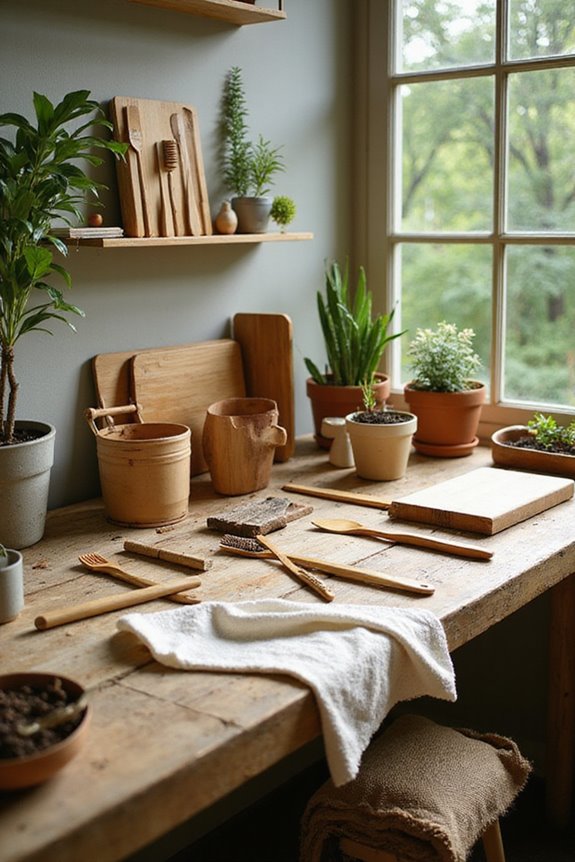
When we consider the environmental benefits of bamboo, its reduced need for chemicals stands out. Bamboo grows quickly and typically doesn’t require fertilizers or pesticides, making it a more eco-friendly option. However, we should be aware of potential chemical risks during processing, like the use of bleaches and dyes, which can diminish its benefits. To guarantee sustainability, effective chemical monitoring is essential. Regulatory gaps in some regions can lead to unchecked chemical use in bamboo cultivation, impacting environmental health. By pushing for better regulations and transparency, we can promote safer bamboo production practices. Supporting local and organic farming methods not only minimizes chemical use but also helps us foster a community committed to sustainable living. Additionally, integrating practices like composting can further enhance soil health and reduce reliance on chemical fertilizers.
Sustainable Alternatives to Traditional Materials
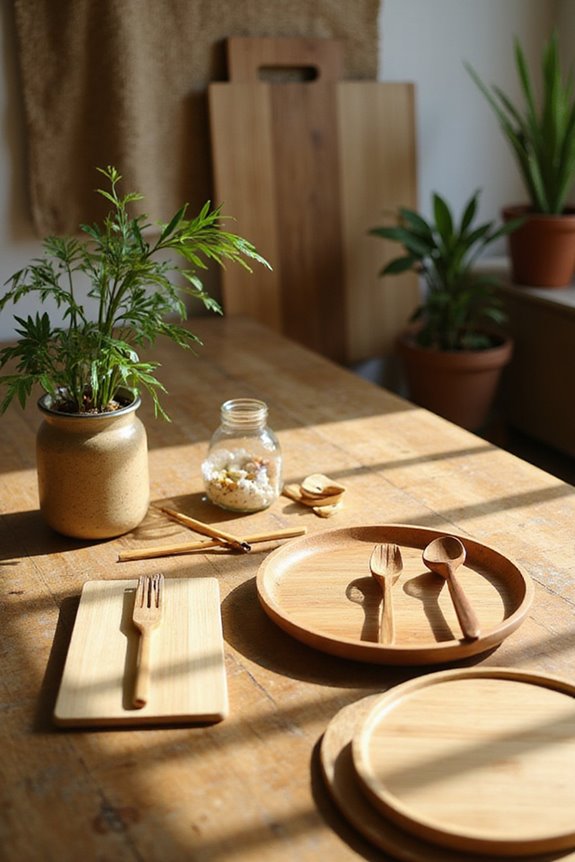
Sustainable materials play an essential role in our efforts to protect the environment, and bamboo stands out as a prime alternative to traditional resources. Here’s why bamboo innovations are important:
- Rapid Renewability: Bamboo matures in just 3 to 5 years, unlike hardwoods that take decades. This means we can harvest it without harming ecosystems.
- Carbon Sequestration: Bamboo absorbs CO2, making it carbon-negative or neutral, depending on its processing. This helps reduce overall emissions.
- Biodegradability: Bamboo products are compostable, minimizing landfill waste. Compared to plastics, they break down naturally without harmful residues.
- Eco-Friendly Packaging: Bamboo offers sustainable options for packaging, replacing non-biodegradable materials while supporting a circular economy. Additionally, bamboo grows up to 3 feet per day, showcasing its rapid growth compared to other materials.
Economic Viability and Profit Potential
Economic viability and profit potential of bamboo are essential as we explore its role in today’s marketplace. The global bamboo products market is projected to reach $150.1 billion by 2031, fueled by market trends favoring sustainability. This growth opens up significant investment opportunities in various sectors such as construction and textiles.
- Job Creation: Bamboo farming creates employment in rural areas, enhancing local economies.
- Diverse Products: With a wide range of applications, bamboo products can cater to various consumer needs.
- Increased Demand: The rising preference for eco-friendly materials means higher profit margins. Additionally, bamboo’s status as a rapidly renewable resource positions it favorably in a market increasingly focused on sustainability.
Air Quality Improvement
Air quality improvement is one of the many environmental benefits of bamboo. This remarkable plant releases 35% more oxygen than a similar stand of trees, making it a powerful ally in combating air pollution. Its rapid growth allows for continuous oxygen replenishment, which is essential in urban areas that often suffer from poor air quality.
Moreover, bamboo can thrive in degraded lands, helping revitalize ecosystems where other plants might struggle. By replacing materials like steel and concrete, bamboo not only sequesters carbon but also avoids emissions during production. Additionally, the use of bamboo in products like bamboo coat racks promotes sustainability while enhancing our living spaces.
Incorporating bamboo into urban greenery initiatives can greatly enhance our living environments, promoting healthier air for everyone. Together, we can support cleaner air and a more sustainable future.
Biodiversity and Ecological Considerations
Bamboo plays an essential role in supporting biodiversity and maintaining ecological balance. It serves as critical habitats for many species, including the endangered giant panda, which relies on bamboo for food and shelter. Additionally, bamboo forests provide refuge for unique species like Madagascar’s ploughshare tortoise and the mountain bongo in Africa.
- Ecosystem Resilience:
- Bamboo’s adaptability enhances ecosystem resilience against environmental changes.
- Its dense root systems stabilize soil and prevent erosion, protecting natural habitats.
- Bamboo enriches soil organic matter, promoting diverse plant life.
- Healthy soil supports water retention, benefiting various species habitats. Moreover, its ability to grow rapidly makes it a fast-growing species that can help restore degraded land more efficiently.
Rapid Growth and Regeneration
As we’ve seen, supporting biodiversity and maintaining ecological balance are important benefits of bamboo. One remarkable feature is its rapid growth. Certain species can grow over 1 meter a day! This quick growth allows bamboo cultivation to thrive, offering sustainable harvesting techniques.
Bamboo shoots reach full height in less than a year, and their extensive root systems mean they regenerate rapidly after harvesting. This self-reproducing nature eliminates the need for replanting, making bamboo a more sustainable option than slower-growing trees.
Additionally, bamboo’s adaptability allows it to flourish in various conditions, further supporting its role in eco-friendly practices. By choosing bamboo products, we can help promote a sustainable future while benefiting from its unique growth characteristics.
Frequently Asked Questions
How Does Bamboo Compare to Other Renewable Resources?
When we explore renewable resources, bamboo’s sustainability and versatility shine brightly. Its rapid growth and eco-friendly attributes invite us to embrace a greener future together, fostering a sense of belonging in our shared environmental journey.
What Maintenance Is Required for Bamboo Products?
It is understood bamboo care is essential for product longevity. By regularly cleaning, oiling, and storing bamboo properly, we can preserve its beauty and functionality, ensuring our shared commitment to maintaining these sustainable treasures for years to come.
Can Bamboo Products Be Recycled or Composted?
We can’t stress enough how amazing it is that bamboo products can be both recycled and composted! Together, we can embrace bamboo recycling and composting, ensuring a greener future for our communities and the planet.
What Are the Limitations of Bamboo Cultivation?
When considering bamboo cultivation, we should recognize the limitations, such as susceptibility to bamboo diseases and specific soil requirements. By understanding these challenges, we can cultivate bamboo sustainably, ensuring our shared environmental responsibility.
How Does Bamboo Impact Local Economies?
Bamboo greatly impacts local economies, creating jobs and boosting bamboo markets. Together, we can appreciate how bamboo cultivation not only supports livelihoods but also fosters community growth and entrepreneurship, making it an essential resource for us all.

